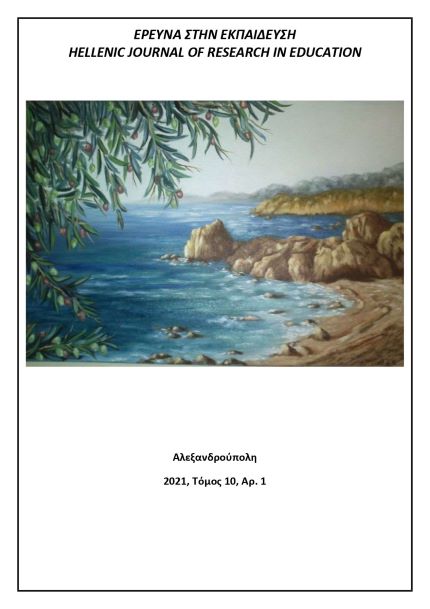Ηλεκτρονική επικοινωνία σχολείου και οικογένειας την περίοδο της πανδημίας COVID-19

Περίληψη
Η πανδημία COVID-19 συνιστά μία πρωτόγνωρη συνθήκη σε παγκόσμιο επίπεδο με πολλαπλές επιδράσεις σε όλους τους τομείς της ανθρώπινης ζωής. Μία επίδραση της πανδημίας αφορά και στην επικοινωνία σχολείου και οικογένειας, η οποία μετατράπηκε σε ηλεκτρονική. Η παρούσα εργασία πραγματεύεται την επικοινωνία σχολείου και οικογένειας την περίοδο της πανδημίας COVID-19 στη δευτεροβάθμια εκπαίδευση, όπως αποτυπώνεται από τους/τις διευθυντές/ντριες των σχολικών μονάδων. Ειδικότερα, εξέτασε: α) τα ηλεκτρονικά μέσα που υιοθετήθηκαν, β) τη θεματολογία της επικοινωνίας κατά την περίοδο της πανδημίας COVID-19 σε σχέση με την προηγούμενη χρονική περίοδο, γ) την αξιολόγηση του τρόπου διεξαγωγής της ηλεκτρονικής επικοινωνίας, δ) τον ρόλο της αστικότητας της περιοχής του σχολείου, και ε) την ύπαρξη ή μη διαφορών με βάση τα δημογραφικά στοιχεία του δείγματος και τον τύπο σχολείου που υπηρετούν οι διευθυντές/ντριες (σχολικές μονάδες γενικής και ειδικής αγωγής). Η μελέτη συνιστά μία ποσοτική έρευνα. Το δείγμα ήταν 62 διευθυντές/ντριες σχολείων δευτεροβάθμιας εκπαίδευσης (65,7% άντρες και 32,3% γυναίκες, με μέσο όρο ηλικίας 53,2 έτη). Για τη συλλογή των δεδομένων χορηγήθηκε ένα αυτοσχέδιο ερωτηματολόγιο. Η ανάλυση των δεδομένων βασίστηκε σε ποσοτικές μεθόδους. Η έρευνα ανέδειξε ότι η πανδημία COVID-19 επέφερε σημαντικές αλλαγές στην επικοινωνία σχολείου και οικογένειας, η οποία διακρίνεται για μία μεγάλη ποικιλία ηλεκτρονικών μέσων και πρακτικών. Τα θέματα της επικοινωνίας έχουν αναδιαμορφωθεί και επηρεαστεί από την κατάσταση κρίσης. Η εξ αποστάσεως διδασκαλία κυριάρχησε στη θεματολογία της επικοινωνίας σχολείου και οικογένειας. Η στάση της οικογένειας και των μαθητών/τριών απέναντι στην ηλεκτρονική επικοινωνία, όπως αξιολογήθηκε από τους/τις διευθυντές/ντριες, ήταν κυρίως θετική. Η αστικότητα της περιοχής του σχολείου καθόρισαν τα μέσα και τις πρακτικές της επικοινωνίας. Τέλος, δεν παρατηρήθηκαν στατιστικά σημαντικές διαφορές στις απαντήσεις των διευθυντών/ντριών με βάση το φύλο, την ηλικία και τον τύπο σχολείου που υπηρετούν (σχολεία γενικής και ειδικής αγωγής). Η έρευνα προτείνει ότι η πανδημία COVID-19 επέφερε ποικίλες αλλαγές στην επικοινωνία σχολείων δευτεροβάθμιας και οικογένειας.
Λεπτομέρειες άρθρου
- Πώς να δημιουργήσετε Αναφορές
-
Κεσσοπούλου Μ., & Τσιμπιδάκη Α. (2021). Ηλεκτρονική επικοινωνία σχολείου και οικογένειας την περίοδο της πανδημίας COVID-19. Έρευνα στην Εκπαίδευση, 10(1), 137–160. https://doi.org/10.12681/hjre.26971
- Τεύχος
- Τόμ. 10 Αρ. 1 (2021)
- Ενότητα
- Άρθρα

Αυτή η εργασία είναι αδειοδοτημένη υπό το CC Αναφορά Δημιουργού – Μη Εμπορική Χρήση – Παρόμοια Διανομή 4.0.
Τα πνευματικά δικαιώματα των άρθρων του περιοδικού ανήκουν στους συγγραφείς. Τα άρθρα διατίθενται με άδειες Creative Commons CC-BC-SA 4.0


